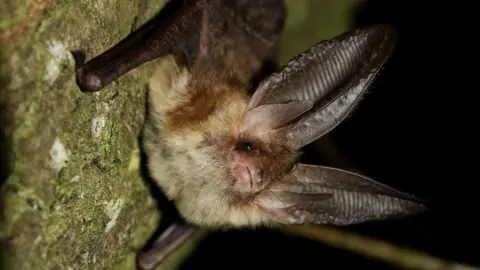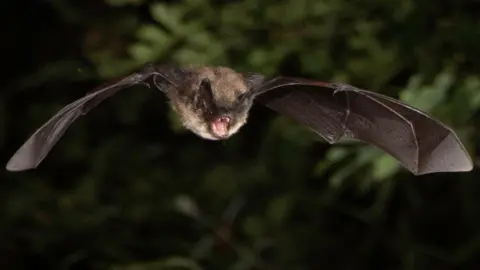Island volunteers 'save 45 years of bat research'
 Chris Demant
Chris DemantA survey of Bailiwick bat species would have taken more than 45 years to complete without the help of hundreds of local volunteers, according to the States.
The now completed Bailiwick Bat Survey was a volunteer-led initiative organised by the British Trust for Ornithology (BTO), the States of Guernsey and Bailiwick La Sociétés and wildlife trusts.
Between 2021 and 2024, 420 volunteers collected more than 16 million bat sound recordings, which included six bat species never previously recorded in the Bailiwick.
Julia Henney, the States' senior natural environment officer, said the survey would have taken one researcher decades to complete and would have cost up to £2m.
Volunteers who signed up to the survey were able to borrow sound recording equipment, which was installed in areas across the Bailiwick for up to seven nights.
The recordings were uploaded to the BTO's Acoustic Pipeline for analysis, providing initial results within hours.
"This survey has changed and broadened our understanding of bats across the Bailiwick of Guernsey," said Ms Henney.
"This has all been possible thanks to keen volunteers getting stuck in, increasing community awareness of nature, as intended through Guernsey's Strategy for Nature."
She added: "It would've taken one researcher over 45 years to gather this amount of data, potentially costing up to £2m, which serves to highlight the value of our community's efforts in gathering this insightful data."
 Chris Demant
Chris DemantVolunteers conducted 9,426 nights of recording at 2,364 locations, collecting more than 16 million triggered sound recordings.
Four million bat identifications were confirmed, including the presence of 14 bat species, six of which were never previously recorded in the Bailiwick.
Four of the six newly recorded species, serotine, Leisler's bat, common noctule and parti-coloured bat, are rare visitors to the islands.
While the lesser horseshoe bat and whiskered or Brandt's bat appeared to be rare residents, according to the survey results.
The study also found that underground tunnels from the Nazi German occupation were important roosting and hibernation sites for several of the rarer species of bats.
BTO and the States of Guernsey worked in partnership with La Société Guernesiaise, Alderney WIldlife Trust and La Société Sercquaise on the project.
Sarah Allez, project coordinator of the Bailiwick Bat Survey said: "The survey highlights the importance of citizen science in large-scale biodiversity monitoring and engaging the community in nature conservation."
Follow BBC Guernsey on X and Facebook and Instagram. Send your story ideas to [email protected].
